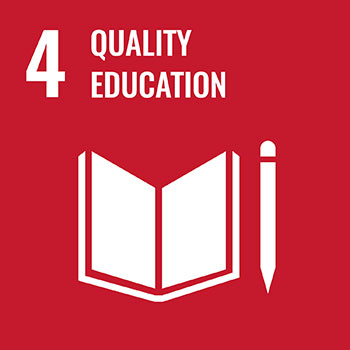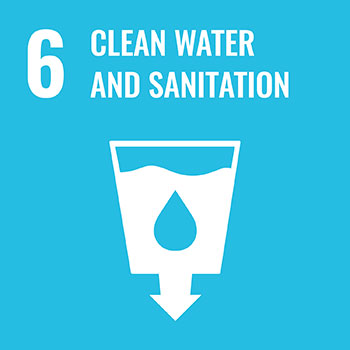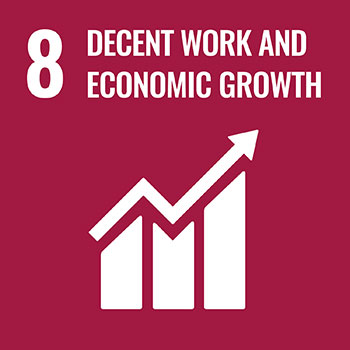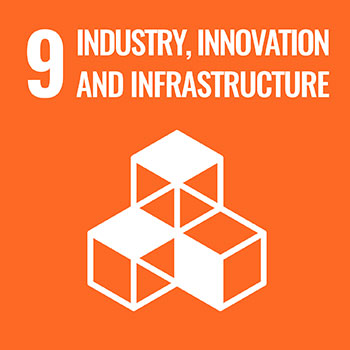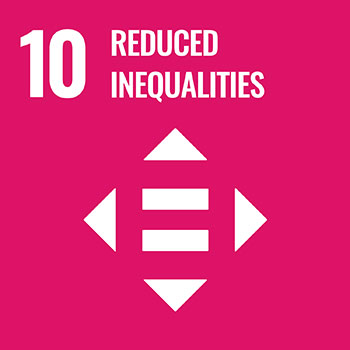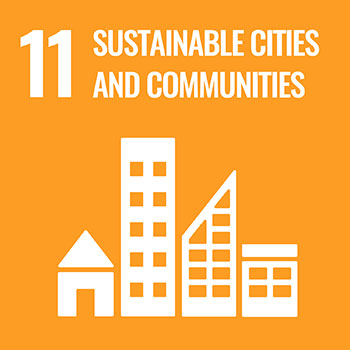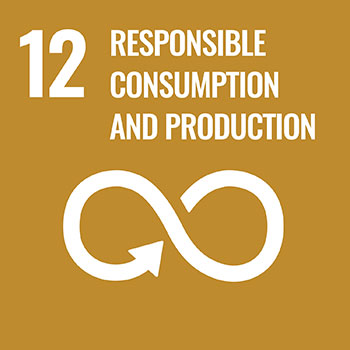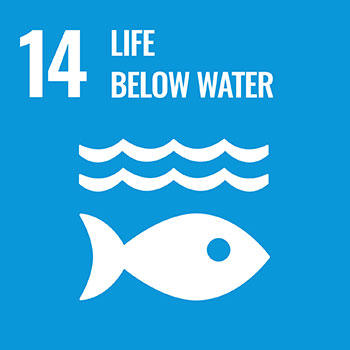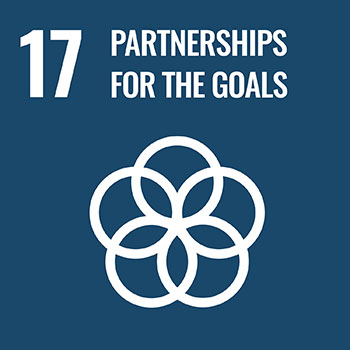Search for academic programs, residence, tours and events and more.
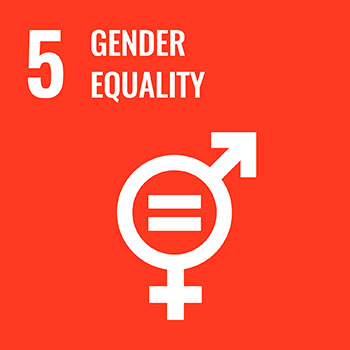
Achieve gender equality and empower all women and girls.
Wilfrid Laurier University is steadfast in our commitment to a more inclusive world where gender equality is realized, and all women and girls can fully participate in society and reach their full potential. We engage in a range of initiatives that promote gender equality on our campuses and beyond, working to advance SDG 5.
The work that Laurier completed in 2023 to advance SDG 5.
As the first woman to complete the requirements for a PhD in Mathematical and Statistical Modelling at Laurier, Hina Shaheen hopes to inspire other women considering post-secondary education in science, technology, engineering and mathematics (STEM) fields.
Laurier is committed to fostering a university culture where gender-based and sexual violence is not tolerated and survivors are believed and supported with compassion, dignity and respect. Between Nov. 25 and Dec. 10, Laurier hosted programming in support of 16 Days of Activism Against Gender-Based Violence.
Following a glittering sports career in Canadian baseball and hockey, former Laurier Golden Hawk star Ashley Stephenson (BA ’05) is blazing a trail for women within professional baseball.
Chloe Herron, a fourth-year women's rugby student-athlete and psychology major, was named the 16th recipient of the Outstanding Woman of Laurier award, presented by RBC.
Laurier and the Waterloo Chapter of the International Women’s Forum, an organization dedicated to advancing women’s leadership globally, marked International Women’s Day (March 8) with the return to an in-person luncheon event celebrating women’s leadership in sustainability and planetary health.
The Laurier Centre for Women in Science celebrated 10 years of facilitating research by women scientists and about women scientists in order to develop and implement evidence-based strategies.
Laurier research centres advancing SDG 5.
Launched in 2012, the Laurier Centre for Women in Science (WinS) is proud to champion women in science, technology, engineering and mathematics (STEM). The centre is building an inclusive scientific community through research, action and communication. Its ultimate goal is to make the centre redundant.
Laurier initiatives in 2023 that advanced SDG 5.
Laurier’s Institutional Research Office systemically measures and tracks women’s applications and acceptance rates. Some indicators are publicly reported through Common University Data Ontario.
|
Gender Identity |
2021 |
2022 |
2023 |
|---|---|---|---|
|
Female |
|
|
|
|
Male |
|
|
|
|
Another Identity |
|
|
|
|
All Identities |
|
|
|
Laurier’s Strategic Action Plan and Academic Plan include commitments to diversify its student body and increase representation of students historically underrepresented on campus. This includes women. Laurier’s Equity, Diversity and Inclusion (EDI) Strategic Plan highlights the use of an EDI Data Specialist to systematically collect, analyze and track demographic student data. The EDI Data Specialist develops and implement plans to address differential outcomes identified through data analysis with a view to identifying and reducing barriers to student success and wellness, including funding, bursaries and scholarships for students and student-athletes from equity-deserving groups.
Laurier is committed to ensuring that our university student body represents the diversity of the Canadian population and is accessible to all sectors of society. The recently launched Laurier Strategy sets the foundation for the institution’s success. A key metric of the plan is measured diversity within the student body across key demographics. The university encourages applications from all qualified persons including women, members of visible minorities, First Nations, Métis and Inuit, persons with disabilities, and sexual and gender minorities.
Laurier's Policy 6.1 Prevention of Harassment and Discrimination and Sexual Misconduct further affirms Laurier’s commitment to EDI and Indigeneity as part of its core values, and understands that the effective creation and dissemination of new knowledge must take place in an academic community that is free from harassment, discrimination and sexual misconduct, where all members of our community have equal opportunity to be successful.
The Ontario Human Rights Code prohibits discrimination against any person because of age; ancestry, colour, race; citizenship; ethnic origin; place of origin; creed; disability; family status; marital status (including single status); gender identity, gender expression; receipt of public assistance (in housing only); record of offences (in employment only); sex (including pregnancy and breastfeeding); and sexual orientation. Laurier complies with the act when it considers students for admission, participation, promotion and graduation.
Laurier’s Policy 8.4 Employment Equity outlines Laurier’s commitment to creating a culture of inclusion where women, among other equity deserving groups, feel accepted and experience a sense of belonging to ensure equal participation in the university.
Laurier offers a range of mentoring and targeted support schemes to support the success of women at the institution. These include:
Of students who choose to self-identify, 53 percent of Laurier's current undergraduate enrolled are female identifying student, according to Ontario Universities' Application Centre data. Our Strategic Action Plan, Equity, Diversity and Inclusion Plan, and Strategic Academic Plan outlines our commitments to increase the participation of diverse student groups, including women, particularly in fields were they are currently underrepresented. Laurier is home to a number of initiatives to increase the participation of women in these fields:
Laurier is committed to EDI and Indigeneity as part of its core values, and understands that the effective creation and dissemination of new knowledge must take place in an academic community that recognizes the dignity and value of all students, staff and faculty members. The university is committed to fostering a learning, scholarly and workplace environment that is free from harassment, discrimination and sexual misconduct.
Laurier’s Policy for the Prevention of Harassment and Discrimination and Sexual Misconduct affirms that women within the Laurier community have a right to equal treatment and freedom from harassment, discrimination and sexual misconduct based on the Protected Grounds of the Ontario Human Rights Code with respect to employment and the receipt of education and related services and facilities. Laurier’s Policy on Gendered and Sexual Violence outlines that Laurier is committed to fostering a university culture where:
Laurier’s gender inclusivity initiatives seek to ensure that all members of the university community have an inclusive experience at Laurier. Laurier strives to be a place in which all individuals can express their authentic selves and recognizes that respect and support for transgender and gender diverse people are central to their success and well-being.
"A thriving community where all members of the university can reach their potential" is a key component of Laurier’s 2019-2024 Strategic Plan for EDI. Part of this strategy is to develop and maintain an inclusive environment where everyone can experience a powerful sense of belonging. To support transgender and gender diverse members of the Laurier community, there are a number of programs and initiatives in place, including:
Laurier’s Policy for the Prevention of Harassment and Discrimination and Sexual Misconduct affirms that transgender and gender diverse members of the Laurier community have the right to equal treatment and freedom from harassment, discrimination and sexual misconduct based on the Protected Grounds of the Ontario Human Rights Code with respect to employment and the receipt of education and related services and facilities. Additionally, Laurier Employment Equity Policy affirms Laurier's commitment to created a culture of inclusion where all employees, including those who identify as transgender, feel accepted and experience a sense of belonging.
Laurier offers a variety of mentorship opportunities offering support to all women at the university. These include:
Laurier’s Office of Institutional Research and EDI Data Specialist collect, analyze and track demographic student data, including graduation rates of women. In 2023, 58% of Laurier credentials were awarded to females in undergraduate and graduate programs.
|
Convocation |
Level |
Female |
Male |
Other |
Total |
|---|---|---|---|---|---|
|
Spring |
Undergraduate |
1,828 |
1,142 |
4 |
2,974 |
|
Spring |
Graduate |
372 |
234 |
1 |
607 |
| Spring |
Undergraduate and Graduate |
2,200 |
1,376 |
5 |
3,581 |
|
Fall |
Undergraduate | 527 | 587 |
3 |
1,117 |
|
Fall |
Graduate |
268 |
192 |
2 |
462 |
|
Fall |
Undergraduate and Graduate |
795 |
779 |
5 |
1,579 |
|
Spring and Fall |
Undergraduate and Graduate |
2,995 |
2,155 |
10 |
5,160 |
Laurier's EDI Data Specialist develops and implements plans to address differential outcomes, including graduation rates, identified through data analysis with a view to identifying and reducing barriers to student success and wellness, including funding, bursaries and scholarships for students and student-athletes from equity-deserving groups.
Laurier excels at creating a culture of engagement that develops the whole person and builds reciprocal community relationships by fostering a highly personalized, equitable, diverse and inclusive community in which all members can experience the powerful sense of belonging that has distinguished Laurier throughout its history. It has many programs in place to ensure the success of women at the institution, from application all the way to graduation. These include scholarships, Women in Leadership Laurier, the Centre for Student Equity, Diversity and Inclusion, Centre for Women and Trans People, the Laurier Brantford Women’s Centre, the Laurier Centre for Women in Science (WinS) and the NSERC Chair for Women in Science and Engineering (Ontario).
Discover how Laurier is contributing to United Nations Sustainable Development Goal targets.



